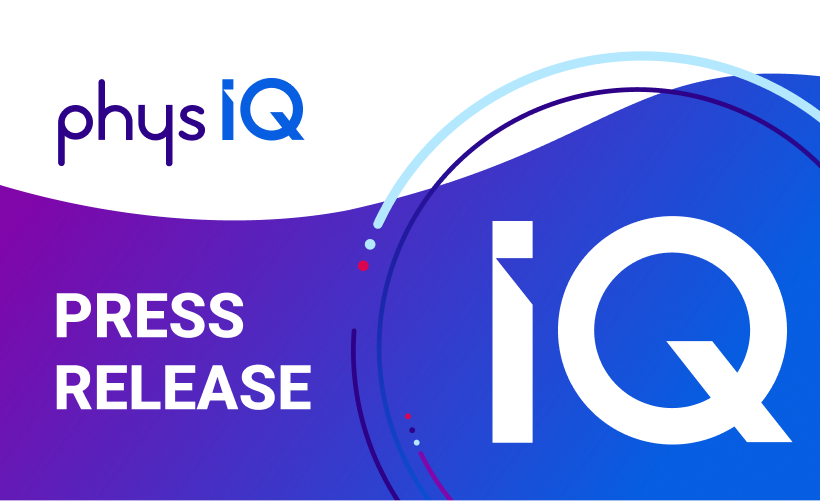Inside an Individual’s Physiological Signature
Originally published in Medical Device & Technology
3 min read
![]() physIQ
:
February 25, 2020
physIQ
:
February 25, 2020

CHICAGO, IL – February 25, 2020 – physIQ, Inc. and the US Department of Veteran’s Affairs (VA) today published the results of a breakthrough study aimed at validating the ability to detect the onset of heart failure exacerbation using wearable sensors and machine learning-based personalized physiology analytics. Published in Circulation – Heart Failure, a journal of the American Heart Association, the LINK-HF study was designed to assess the ability to predict rehospitalization due to heart failure exacerbation using sophisticated analytics applied to continuous wearable sensor data. In the study, 100 patients were enrolled upon discharge from heart failure hospitalization across four VA hospitals and monitored continuously and for up to 90 days without intervention. Post hoc data analysis indicated a mean detection lead time of as high as 10.4 days prior to the hospitalization or ER visit with as high as 88% sensitivity and 86% specificity. Such a lead time interval should permit intervention aimed at preventing hospitalization.
The study evaluated physIQ’s pinpointIQ® continuous data collection platform including patented analytics that use machine learning to automatically establish a personalized model of each individual’s baseline physiological behavior in order to detect subtle anomalies that may be predictive of hospitalization. physIQ’s innovative solution addresses a critical, unmet healthcare need for continuous remote monitoring of patient vital signs without the cost, risks and patient requirements of invasive monitoring procedures.
“This study demonstrates that integration of novel non-invasive technology and machine learning analytics provides an accurate prediction of clinical decompensation in heart failure,” says Dr. Josef Stehlik, Professor of Medicine, Co-Chief of the Advanced Heart Failure Program, University of Utah Health and Salt Lake City Veterans Administration Medical Center. “This work has the potential to reduce hospitalization and improve quality of life of patients with heart failure.”
Upon discharge from heart failure hospitalization, patients in the multi-site observational study were provided a set of disposable 4-day adhesive sensor patches for the chest, and a smartphone to upload their data to the cloud. In the cloud, physIQ’s FDA 510(k)-cleared analytics established a personalized physiologic baseline for each patient. From this baseline, the physIQ algorithms could detect subtle physiologic changes that predicted rehospitalization 7 – 10 days in advance of the hospitalization or ED visit. Moreover, the easy-to-use disposable patches (VitalConnect Inc. San Jose) helped the study achieve a remarkable sensor compliance and data yield throughout the 90-day monitoring.
The newly released publication is noteworthy in the realm of digital medicine, where prospectively designed studies presented in peer-reviewed journals are a rarity. “There is a lot of buzz about digital medicine these days,” said Gary Conkright, CEO of physIQ, “but the reality is that very few companies have been able to demonstrate the clinical rigor required in a healthcare use case. The publication of this study is yet another example of how we at physIQ continue to lead the market in developing FDA-cleared technology and clinical validation.”
The results of the study are relevant for payers and providers looking to establish more scalable solutions for managing at-risk patient populations, as well as for pharmaceutical companies looking to use wearable sensor data to demonstrate efficacy and safety of their products. “Continuous sensor data has enormous potential to transform how we understand trajectories of human health; but these data streams present multiple challenges,” noted Matt Pipke, CTO, physIQ. “Not only is the volume of data massive, but the behavior of physiology in the unconstrained ambulatory setting is rich and complex. Properly validated machine learning and deep learning analytics, like those tested in this VA study, are the key to effectively processing wearable biosensor data to provide clinical users with information they can act on.”
Building on the breakthrough success of this VA heart failure study, physIQ is now leveraging these and other data sets to power deep learning to develop biomarkers that will enable transformational tools to diagnose and monitor disease. These novel biomarkers will allow biopharma companies to revolutionize how they demonstrate clinical value and fundamentally change how payers and health systems care for their at-risk patient populations.
“By giving doctors the information they need to preemptively intervene and prevent patient deterioration, rather than react to what has already happened, physIQ is bringing the power of AI to healthcare delivery in ways that will transform patient care and improve care value,“ said Dr. Stephen Ondra, Chief Medical Officer for physIQ.
Early detection is critical to success in avoiding heart failure rehospitalization. There are currently over 6 million people in the United States diagnosed with heart failure and one million annual hospitalizations. Among them, approximately 20% of patients are readmitted within 30 days of hospital discharge, underscoring the challenges both clinicians and patients face with trying to manage this disease.
####
About physIQ
physIQ is a company dedicated to enabling proactive care delivery models through pinpointIQ™, its highly scalable cloud-based platform for personalized physiology analytics. Our FDA 510(k)-cleared data analytics platform is designed to process multiple vital signs from wearable sensors to create a personalized dynamic baseline for each individual. By mapping vital sign relationships this way, physIQ’s analytics detect subtle deviations that may be a precursor to disease exacerbation or change in health. With applications in both healthcare and clinical trial support, physIQ is transforming continuous physiological data into insight for providers, health systems, payers and pharmaceutical and medical device companies. For more information, please visit www.physIQ.com. Follow us on Twitter and LinkedIn.
Contacts
Jodi Perkins
Outlook Marketing Services
Ph: 847-508-0877

Originally published in Medical Device & Technology

Originally published in Pixel Scientia Labs

Originally published in Crain's Chicago